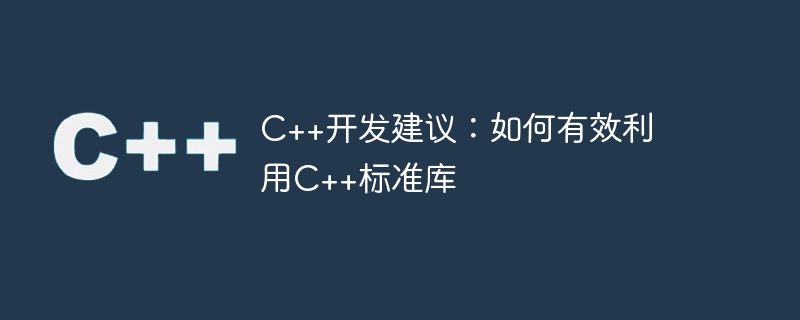Home >Backend Development >C++ >C++ development advice: How to effectively utilize the C++ standard library
C++ development advice: How to effectively utilize the C++ standard library
- WBOYWBOYWBOYWBOYWBOYWBOYWBOYWBOYWBOYWBOYWBOYWBOYWBOriginal
- 2023-11-23 09:08:22986browse

C is a powerful and flexible programming language, and its standard library provides a wide range of functions and tools to help developers quickly develop efficient applications. This article will explore how to effectively utilize the C standard library to improve code quality and development efficiency.
- Understand the C standard library
The C standard library is the core component of the C language and contains many feature-rich classes and functions. The standard library is divided into two main parts: the standard library and the standard template library (STL). The standard library provides a series of common functions such as input and output, string processing, date and time processing, etc. STL is a powerful set of containers and algorithm libraries that can help developers deal with data structure and algorithm problems more efficiently. - Using container classes
The standard library provides a variety of container classes, including arrays, vectors, lists, maps, etc. These container classes can simplify the process of data storage and management, and provide a series of member functions and operator overloads to facilitate data access and operation. Developers can choose appropriate container classes based on actual needs to improve code readability and maintainability. - Learn and apply algorithms
STL provides a series of powerful algorithms, such as sorting, search, copy, etc. These algorithms are highly optimized and tested to provide efficient performance and correct results. Developers can learn these algorithms and flexibly apply them to their own projects to avoid repeated development and improve development efficiency. - Using iterators
Iterator is an important concept in STL and can be used to access and operate elements in a container. Iterators provide a unified way to traverse a container, whether it is an array, vector, map, etc. Using iterators can make code more general and extensible, reducing dependence on specific container implementations. - Make full use of smart pointers
C 11 introduces the concept of smart pointers for managing dynamically allocated memory. A smart pointer is a pointer that automatically manages its life cycle and can help developers avoid problems such as memory leaks and dangling pointers. The standard library provides smart pointer classes such as shared_ptr, unique_ptr and weak_ptr. Developers should make full use of these classes to manage memory and improve the security and maintainability of the code. - Exception handling
The C standard library provides a complete set of exception handling mechanisms to help developers handle errors and exceptions. Using exception handling can improve the robustness and reliability of your code and avoid program crashes or unpredictable results. Developers should learn and use exception handling appropriately to properly handle and recover from abnormal situations that may occur. - Reference documents and official tutorials
The C standard library is very large, with many functions and usages. Developers should always refer to official documentation and tutorials to learn and understand the usage of various classes and functions. Official documentation and tutorials provide detailed instructions and examples to help developers better understand and apply the C standard library.
Summary
The C standard library is an integral part of the C development process and can help developers develop applications more efficiently. By fully understanding and applying the various functions and tools of the C standard library, developers can improve the quality and efficiency of their code, and reduce development cycles and maintenance costs. Therefore, learning and mastering the use of the C standard library is an essential skill for every C developer.
The above is the detailed content of C++ development advice: How to effectively utilize the C++ standard library. For more information, please follow other related articles on the PHP Chinese website!
Related articles
See more- Detailed explanation of how to make Python support fraction types (using the standard library fractions module)
- dedecms5.7 latest sql exploits guestbook.php injection vulnerability
- Use the while statement to find the sum of odd numbers from 1 to 100 in java
- What are the standard libraries in Go language?

